Managing waste is an essential service, but some buildings are not designed appropriately to accommodate a circular economy.


Managing waste is an essential service. If a building is not designed appropriately for waste to be serviced, it does not allow for: source separation, increased recycling, access for large waste collection vehicles or future-proofing the building to accommodate circular economy policy. Poorly designed buildings can result in unsightly bins cluttering the outside of beautiful architecturally designed multi-million dollar properties and cause pedestrian and traffic liabilities. Ultimately, the cost to dispose of waste and the number of safety risks go up in buildings of poor design.
Now in its fifteenth year, Encycle Consulting is a well-respected environmental consultancy undertaking projects nationally. We are best known for providing quality waste management plans for new developments that achieve successful council-approved Development Applications and the best outcomes for the client, building users and waste serviceability.
Our proven process for engaging with our clients and the design teams to thoroughly understand the activities of a building’s future occupants, waste generation and Environmental, Social Governance (ESG) objectives, ensures we are well placed to navigate the complexities of state and local government policies and guidelines.
Many local governments have waste policies and requirements, but this does not guarantee an efficient and effective process, or bring the experience needed to assess a specific building or precinct for waste serviceability. This is especially when the new buildings are unique in the type and quantity of the waste they produce such as stadia, hospitals and university faculty buildings. Sometimes, new state-of-the-art buildings need to integrate within broader precincts such as university campuses and hospitals and careful early planning is required.
Many of the new buildings that Encycle have worked on achieve a formal or informal Green Star rating from the Green Building Council of Australia. Most Green Star projects require an Operational Waste Management Plan. We prepare these comprehensive plans not only for the rating submission but also for the operator of the building, to ensure effective waste management in operation, and include comprehensive waste reduction and resource recovery targets.
Encycle is proud to have provided advice to developers and architects on most of Perth’s Green Star rated buildings, such as Boola Bardip, Lot’s 7, 9 and 10 at Elizabeth Quay and the precinct itself, Woodside’s new headquarters, Karrinyup Shopping Centre, Greater Curtin Stage One buildings, Yagan Square, Brookfield Place, 100 St Georges Terrace, and the recently completed, OneSubiaco development.
Existing buildings, particularly commercial offices, are seeking ratings for their performance in diverting waste from landfill under the National Australian Built Environment Rating Scheme (NABERS) Waste tool. Building owners are seeking NABERS Waste ratings as part of their ESG objectives and/or to attract or retain tenants who have committed to waste reduction and diversion targets within their own organisations.
Hotels are realising that they can’t continue to dispose of vast quantities of food waste to landfill and have reached out for help to measure and find ways to reduce food waste. Hotels that offer buffet-style dining typically waste much more food than a-la-carte restaurants. When disposed of to landfill, food waste is a major source of greenhouse gas emissions and while composting food waste can be an option, it is far more cost effective, socially and environmentally viable to not produce the waste in the first place.
Encycle is headed up by Jenny Campbell who has over 20 years’ experience in the waste and recycling sector. She says “having provided high-quality bespoke resource recovery solutions for many Australian and multi-national companies, family-owned businesses, and government, we are the ‘go-to people’ when it comes to waste minimisation and circular economy in Western Australia”.
Jenny goes on to say, “the time has well and truly come to shift the mindset to not producing waste and transitioning to a circular economy”. The circular economy requires a whole paradigm shift and systems change to build an economy where the value of materials is retained, there is no such thing as landfill and natural systems are regenerated, not depleted.
In a circular economy, Jenny predicts that the future design of buildings will need to include space for materials and items to be carefully stored for reuse, repair, refurbishment, remanufacture, repurposing and not just have a range of colourful bins for recycling and recovery. Hopefully the buildings of the future won’t need to be designed for great big rubbish trucks entering their loading docks, but rather for vehicles of responsible manufacturers to collect their quality products that no longer have a use within the building so that they can disassemble them for reuse or repair and keep the materials circulating at their highest and best use.
When Encycle set up business in 2008, there was no requirement to include a waste management plan in Development Applications. Now, it is mandatory for most developments. Jenny says “back then, Encycle led the way and worked with architects on the first buildings in Perth to achieve a Green Star rating. We influenced state and local government to include waste requirements in the design of new buildings”.
Today the circular economy is gaining momentum at a national and state level. Jenny and her team at Encycle desperately hope that in fifteen years from now, we are well on our way to circularity and hitting net-zero by 2050. Encycle brings the skills and experience in helping us all achieve this.
To learn more about servicing waste and transitioning to the circular economy, contact us at Encycle Consulting.











